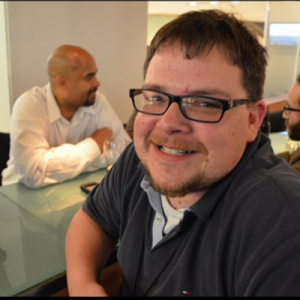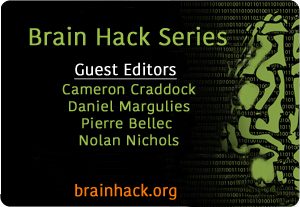Open Science Resources for Contributing to Brain Imaging Research: A Guest Blog by Cameron Craddock
In support of Brain Awareness Week, we have asked Cameron Craddock, Director of the Computational NeuroImaging Lab, Nathan S. Kline Institute for Psychiatric Research and Director of Imaging, Child Mind Institute, to write a blog highlighting open science in neuroimaging, and to announce our upcoming publication of the 2015 Brainhack Proceedings and the Brainhack Thematic Series. BioMed Central are also highlighting some of the amazing benefits of brain research and showcasing the progress being made by researchers around to world.
The principles of open science have permeated neuroimaging to the point that nearly every software tool produced is free and open source and most new neuroimaging datasets are earmarked for data sharing. As these open science resources continue to blossom it is important to reflect on the importance of community-based efforts to nurture these resources so that they maintain their relevance well into the future. Here, I will highlight just a few of the many different ways the community can make a significant impact on open science by contributing their time and effort:
Annotation and Curation of Literature
The scientific literature represents the collective knowledge of a research community, but, can be notoriously difficult to index and even harder to extract meaningful information from. Databasing efforts such as Brainmap and BrainSpell attempt to index the literature by manually annotating publications in their databases with a variety of tags that describe its nature. To enable meta-analyses, these databases also store the brain areas implicated by each publication. Neurovault takes this a step further by asking authors to directly upload the statistical maps produced by their various analyses. Other useful ways to contribute to literature curation involve creating topic-specific literature collections in Mendeley or Citeulike to help make relevant publications easier to find.
Data inspection, Preprocessing, and Manual Correction
There are a variety of large neuroimaging data-sharing repositories available and each has made a gallant effort to organize its data. Nonetheless, there remain many ways in which users of these repositories can contribute their time to make them better. Every user of the raw data from these repositories needs to manually inspect the data to exclude poor quality images, preprocess the data to make it usable for analyses, and potentially make manual corrections to fix preprocessing errors. If done well, each of these steps need only be done once, and can be shared with all of the other users of the data. Additionally, particularly time consuming corrections could be accomplished much faster if performed by many. As one example, the Preprocessed Connectomes Project is performing these tasks for the data shared through the International Neuroimaging Datasharing Initiative, but given the widespread use of such data, further initiatives of this sort would be a welcome contribution from the wider community.
Software Review, Testing, and Evaluation
Free and open source software tools are the backbone of neuroimaging and there are many ways that the community can contribute to improving their quality. Simply providing feedback on usability and bug reports are in themselves invaluable contributions. Other important contributions include: performing detailed code reviews, improving the build system, setting up continuous integration testing, optimizing the code to work more efficiently or use high performance computing, simplifying software installation, etc… The Neurodebian software repository and the testkraut software testing framework are two examples of projects that are improving the usability and quality of neuroimaging software.
The lack of a system for providing scientific compensation for the effort spent on these types of contributions is a major hurdle that limits more widespread involvement. Although platforms have been created for publications describing shared data and new software tools, nothing currently exists for describing large-scale collaborative crowdsourcing initiatives. For these reasons it is very important to acknowledge the contributors of the open science repositories you benefit from in your publications. Zenodo can help with this by providing ISBNs and citable references for different versions of project outputs, which would essentially enable to the author list to expand as new contributors are engaged. The Duecredit project provides a means for tracking the citations for the various software tools that are used in performing an analysis, to help avoid leaving anyone out.
Brainhack: Open Tools for Neuroscience – Calling for Papers
In 2012, my colleagues in the Neuro Bureau and I started hosting Brainhack events to convene researchers from a variety of backgrounds to work together in open collaboration. Many of the projects performed during these events are contributions of effort aimed to improve existing open science resources. We feel that GigaScience is a natural partner for Brainhack given their ethos of supporting openness and reproducibility in science by publishing all research objects (open data, tools, workflows and pipelines). And in partnership, we will be publishing annual Brainhack Proceedings to provide attendees with a peer reviewed publication outlet for reports on projects performed during Brainhack events.
We plan for the 2015 Brainhack Proceedings to be out by the end of March 2016. We have also partnered with GigaScience to publish a Brainhack Thematic series for full-length publications that describe projects in neuroscience that embody the ethos of open science. Example topics include open source software tools, data repositories, collaborative projects, and other open science initiatives – regardless of whether they have roots at Brainhack events. I look forward to your contribution to both of these publication venues and look forward to the opportunity to collaborate with you at an upcoming Brainhack event.
Please join me in the upcoming Brainhack events:
- 26-30 June, 2016 OHBM Hackathon, Lausanne, Switzerland
- 18-20 September, 2016 Brainhack Vienna, Vienna, Austria
- 10-12 November, 2016 Brainhack LA, Los Angeles, USA
Acknowledgement
I would like to thank Daniel Margulies for his helpful comments that helped to improve the quality of this blog.
See what else we’re doing in support of Brain Awareness Week here.

